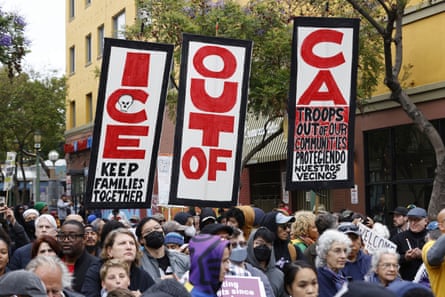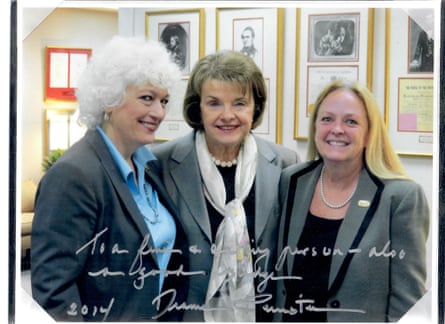Dana Leigh Marks had the kind of career most immigration judges dream of.
At 32, she won a precedent-setting supreme court case that made it easier to claim asylum in the US. In the decades that followed, she led the National Association of Immigration Judges to gain collective bargaining rights, fought to protect immigration courts from political meddling and blazed a trail for a generation of female judges.
Now retired at 71, she’s seen her share of political ups and downs over her 10 years as an immigration lawyer and 35 years on the bench. But nothing could have prepared her for what she’s seen the Trump administration do to the court systems she once served.
“I have seen my entire career destroyed by Trump in six months,” said Marks, reflecting on the state of her profession while sipping coffee near her home in Marin county, just across the Golden Gate Bridge from San Francisco, where she spent much of her career. “I’m flat out terrified on all fronts.”
Whip-smart, with a shock of white curls, Marks can speak more freely than a sitting immigration judge. And the picture she paints is alarming.
Trump’s immigration crackdown has thrown the already backlogged courts into chaos. More than 100 immigration judges have been fired since Trump was sworn in, including roughly a third of the judges in San Francisco, home to one of the largest immigration courts in the country. People across the US are routinely arrested outside their court hearings by Ice agents “acting like the Gestapo”, Marks said.
She described her former colleagues as under siege. “If I were an immigration practitioner now, I’d tell my clients that they have to act like they’re in a war zone,” she said. “Be prepared for any eventuality, because it is so random and so chaotic.”
Despite the grim subject matter, Marks is full of wisecracks and seems to have her spirits permanently set on high – gushing at every passing dog and baby.
“Immigration judges do death penalty cases in a traffic court setting” is among her oft-quoted zingers.
She describes the frenetic work of an immigration judge as like “the guy behind the curtain in The Wizard of Oz”: managing dockets, juggling courtroom tech and interpreters, typing verbatim notes while monitoring audio recording levels, then issuing immediate oral rulings with few clerks and barely any time to think. It’s an already frenzied job, and one she believes the Trump administration is intentionally trying to make harder.
Humor aside, her message for the public is a serious one: that the Trump administration is “attacking” immigration courts “on all fronts” in order to eliminate them entirely by proving they’re “dysfunctional”. There’s a backlog of 3.6m cases waiting to be adjudicated, and Marks believes the courts have been purposefully starved of resources.
“I feel like the immigration courts are the canaries in the coalmine,” she said, “and what’s happening to them is an illustration of what might happen to other court systems if we don’t stop it.”
A critical eye and an open mind
Marks’ interest in refugees and the immigrant experience comes from her own family’s lucky escape to America.
“I was raised with an awareness of immigration to begin with,” said Marks. Her Jewish grandmother fled pogroms in Lithuania and was on one of the last boats to the US before the first world war severely restricted transatlantic migration. By the 1920s, the US enacted laws imposing strict quotas on refugees from eastern and southern Europe that almost completely shut down legal pathways for Jewish refugees fleeing the Holocaust.

Marks grew up in a diverse part of west Los Angeles, and spent a year in Chile after Salvador Allende’s election, where she learned Spanish and saw first-hand the dissonance between US media coverage of his presidency and how Chileans talked about politics around dinner tables. She learned to read and listen to many perspectives with a critical eye and an open mind.
She wanted to be a social worker, but went to law school and nearly dropped out before falling in love with immigration law. “You met the world coming into your office,” she said, describing her years in private practice.
In 1987, at the age of 32, she won the supreme court case known as INS v Cardoza-Fonseca, which expanded asylum eligibility by granting relief to those with a “well-founded fear” of persecution. The morning after that victory, she started her training to become a judge.
Alongside her work in court, she led the National Association of Immigration Judges for nearly two decades and recruited half a dozen female judges to the bench. She prided herself on using compassion and humor to lower the tension in her courtroom: when people feel heard and judged fairly, they’re more likely to accept your decisions, she said, even when you rule against their claim.

Marks retired in 2021 to become “Nana Dana” and care for her grandchild, but she remains deeply engaged in the field, speaking at conferences, advising the National Association of Immigration Judges, educating law students, officiating weddings and serving on the advisory board of the non-profit Justice Connection.
What’s been playing out now in courtrooms, in policy memos and on the streets has chilling echoes of the authoritarian eras her Jewish ancestors fled.
Among her more recent concerns is the push to recruit hundreds of military lawyers to serve as immigration judges. In late August, the Trump administration scrapped the rule requiring temporary immigration judges to have spent a decade practicing immigration law before qualifying for the bench. Days later, 600 military lawyers were cleared to fill vacant judge seats. All of this is “absolutely unprecedented”, said Marks. “I don’t want to slam military lawyers, but there is the concern that they’re being picked because there’s a perception that they will just follow orders.”
Political interference in the court
For Marks, political encroachment on immigration courts has been “a slow creep that now has gone to light speed”.
A hallmark of American democracy is the separation of powers and an independent judiciary. But this has never been so for immigration courts, which are overseen by the Department of Justice, a part of the executive branch rather than the judicial branch.
“Deep in my bones, I always felt the placement of the immigration court in the Department of Justice was wrong,” she said. “The boss of the prosecutor should not be the boss of the judge.”
The court’s placement has led to political interference and underfunding by both parties in power, and Marks wanted to fight back. She spent decades advocating for the nation’s immigration court system to be moved out from under the political whims and meddling of the justice department and into an independent judiciary. In 2022, the congresswoman Zoe Lofgren introduced a bill that would have created an independent immigration court system – but the bill ultimately died. Marks thinks reviving that bill should be a top priority for Democrats.
She believes everyone across the political spectrum should be incensed by the current level of meddling with due process: from firing immigration judges, to pressuring them to toss out asylum cases so they can be reassigned as emergency deportations, to turning courthouses into traps where Immigration and Customs Enforcement agents scoop up immigrants to meet deportation quotas, and more.
“Americans were raised with the golden principle that everybody deserves due process, and I really think the majority of Americans believe that, and that that’s what makes us exceptional in the world,” she said.
“What kills me, as a lawyer, is that Trump turns everything on its head and blows through clearly established legal precedent as if it doesn’t exist. Fealty to precedent is the core of our legal system.”
If there’s a silver lining for her, it’s that she predicts the administration’s embrace of chaos will ultimately backfire. For example, she thinks that dropping military reservists on to the bench for six-month stints is a recipe for failure. Rather than expediting the backlog of asylum cases, it will unleash chaos, “screw up the records” and “make appeals go wild”.
“If you build by chaos, even if you’re right in what you construct,” she quipped, “it’s going to crumble.”

 German (DE)
German (DE)  English (US)
English (US)  Spanish (ES)
Spanish (ES)  French (FR)
French (FR)  Hindi (IN)
Hindi (IN)  Italian (IT)
Italian (IT)  Russian (RU)
Russian (RU)  2 hours ago
2 hours ago
























Comments